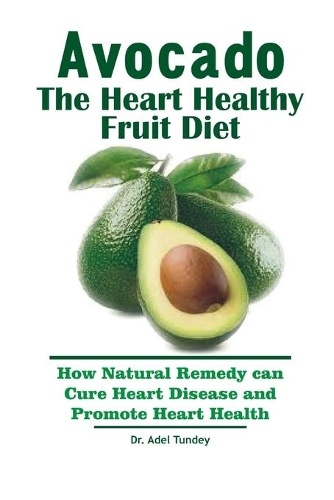
Avocado: The Heart Healthy Fruit Diet: How Natural Remedy can cure Heart Disease and Promote Heart Health
Series:
Avocados contain a variety of nutrients and photochemical that have individually been related to cardiovascular benefits. Avocados consist of ∼10% MUFAs. The American Heart Association guidelines strongly encourage substituting MUFAs in place of SFAs and trans fatty acids for both primary and secondary prevention of cardiovascular disease (CVD). A meta-analysis of controlled trials found an increa
NaN
VOLUME
English
Paperback

Avocados contain a variety of nutrients and photochemical that have individually been related to cardiovascular benefits. Avocados consist of ∼10% MUFAs. The American Heart Association guidelines strongly encourage substituting MUFAs in place of SFAs and trans fatty acids for both primary and secondary prevention of cardiovascular disease (CVD). A meta-analysis of controlled trials found an increase in HDL cholesterol and a decrease in other serum lipid markers for CVD when MUFAs isoenergetically replaced carbohydrates in the diet. There was an overall risk reduction in all-cause mortality (11%), cardiovascular mortality (12%), cardiovascular events (9%), and stroke (17%) with higher MUFA intake than with lower MUFA intake in another meta-analysis of cohort studies. Consistent with these findings, an analysis of data on adults from the NHANES 2001-2006 found that avocado consumers had higher HDL-cholesterol concentrations levels, a lower risk of metabolic syndrome, and lower BMI and waist circumference than did nonconsumers .Avocados contain fiber, potassium, and magnesium, all of which are associated with cardiovascular health. Avocado carbohydrates consist of ∼80% dietary fiber, which is composed of 30% soluble and 70% insoluble fiber. A current meta-analysis found that greater dietary fiber intake is associated with a lower risk of CVD. One medium avocado fruit contains ∼9 g fiber, which would be a substantial contribution to the Adequate Intake of 14 g/100 kcal. Clinical studies suggest that potassium may promote blood pressure control. Another recent meta-analysis found that higher potassium intake was associated with a reduction in blood pressure in patients who were not taking antihypertensive medication. Similarly, usual dietary intake of magnesium is associated with a decreased risk of CVD, including fatal ischemic heart disease. One avocado contains ∼690 mg K and 39 mg Mg.Modifiable cardiovascular risk factors that have the potential to be favorably altered by avocado consumption include hyperlipidemia, inflammation, blood pressure, blood glucose and insulin concentrations, metabolic syndrome, and body-weight and -fat composition. One previous systematic review examined the effect of avocado consumption on blood lipid concentrations, but, to our knowledge, there has not been an in-depth, critical, and comparative analysis of the contemporary literature reporting on all biomarkers of cardiometabolic risk. Given the evidence that individual nutrients found in avocados are related to a decreased risk of CVD, the purpose of this systematic review was to critically appraise and summarize the data related to avocado consumption on incident CVD and biomarkers of CVD risk.
Price Comparison [India]
In This Series
Bestseller Manga
Trending NEWS




















